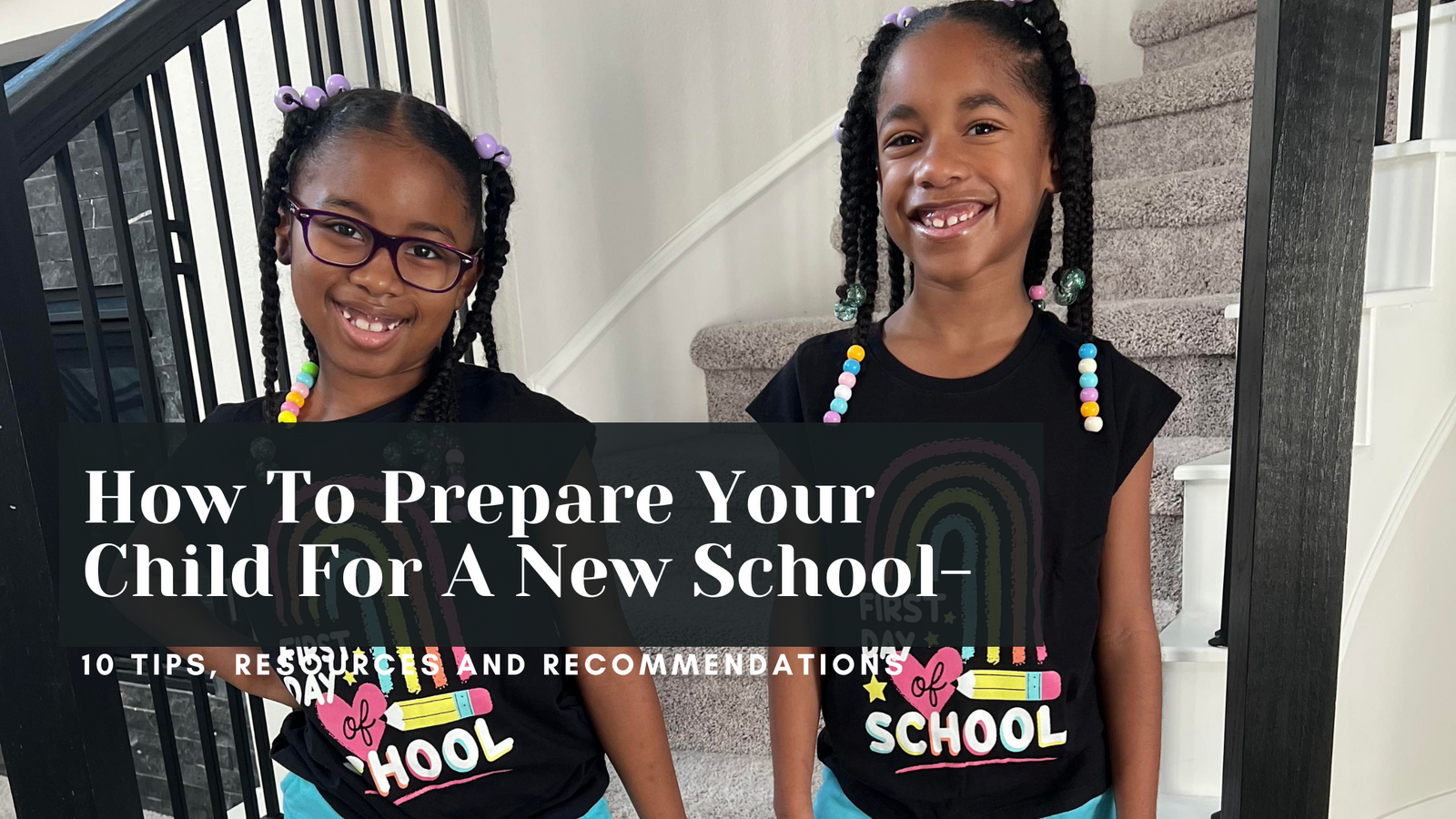How To Navigate A New School After A Move

Wondering how your children will adjust to a new school? I absolutely understand and can relate to all the questions going through your mind. Great news is, I can help.

In this Article:
- How To Prepare For A New School
- 10 Tips For Helping Your Child Adjust To A New School
- First Day Prep
- Recommendations For Safe School Shopping
How To Prepare For A New School
Attending a new school can be challenging for anyone, but the great news is, there are ways to help the transition goes smoothly.
In order for this transition be seamless, there's an exercise you must practice as the parent before you can prepare with your student. *Assuming you have selected the school district you're moving to and have identified the school your child will be attending, do these things:
- Be honest about your feelings and sit with them.
- Think about all the things that make you feel worried and write them down.
- Write down things you look for that would make this a suitable school for your child.
This can be things like: academic testing scores, bullying policies, school safety protocols, community involvement and campus activities, diversity and inclusion, and the moral and happiness of school teachers and students. - Gather all your questions, call the school to schedule a walkthrough WITHOUT the kids, and meet with an administrator during your visit who can answer concerns you have.
Once you have an idea about what it is you're truly looking for in this transitional period, you can begin to construct a solid plan to prepare for the move with your child.
10 Tips For Helping Your Child Adjust To A New School
My family and I had lots of newness this year. We moved to a new city, built a new house, got pregnant and had a new baby, and finally our girls started at a new school.
With all the newness going on, we wanted to make sure our girls weren't overwhelmed and could enjoy each new moment little by little, so here's what we did to make sure of it.
1. Make the announcement fun and exciting.
Anytime you're dealing with something new, it's important to highlight the good things that come with it as opposed to making your kids feel like they're going to be leaving behind what they're used to. Make it fun and exciting. Allow them to feel the joy around what's to come.
2. Talk with them about what they want to have in their new school.
This feedback will vary with age, but talking helps. Before the announcement, we identified things we knew that made our girls happy in their current routine and things they've shared they wish they had more of or could do. We focused on making sure those concerns would be addressed, i.e. meeting new friends, being able to play with kids in our neighborhood, shorter commutes, having more time at home with family, etc.
3. Visit the school before the first day.
Give them an idea of where they're going. Just like you, your child will likely have lots of questions that need to be answered before feeling at ease. It's important to give your child the space to explore this uncertainty.
Visiting the campus a few times before school starts helped my family, tremendously. By the time meet the teacher rolled around, we all shared the same sense of security and comfort in knowing this was a great decision.
4. Practice meeting new friends.
This isn't something that I could have thought of myself as a parent, so I'll give my kids credit for this. I overheard my children practicing how they would introduce themselves and ask for friendship. They practiced over and over up until the night before school and even on the car ride there. We assured them they were going to do great and they did!
5. Meet the Teacher.
I must piggy back off #3 and strongly encourage going to meet the teacher. For more reasons than one, but most importantly so you can know who your children are going to be assigned to throughout the year and so they can know who to look for on the first day. Aside that, it gives your child another opportunity to get excited about the school year ahead.
6. Wait a while to revisit old friends.
I would advise the strong use of your discretion on this one, as it may be very dependent upon age, the time of year you child is due to start at a new school, and other variables... but try waiting a little while to visit with old friends. It may make separation that much harder.
For context and perspective, I have very social second graders. Over summer break, we focused on family time, making memories at home and keeping busy. We had lots of family date nights scheduled and spent lots of time preparing for a new baby, so the request for play dates didn't come up. Because we had a lot of newness at once, I would have made an exception to this recommendation. So, if your situation doesn't involve lots of changes at once like mine did, I would recommend limiting play dates with old friends.
7. Wait until the new school year begins.
I know things happen that are sometimes out of our control, but if you can, finish out the current school year where you are. This will allow your children to be new at the same time other kids are new and will reduce the big emotions behind sudden change, leaving friends prematurely, and being the new kid on the block.
8. Meet other families in the area.
Join the school's PTO (parent teacher organization) and get involved with things that are going on at the school. Your involvement will help your child foster the courage to participate in school activities, build friendships quicker, and will help to make their new school feel more like 'home.'
9. Keep your routine similar.
Even though their environment is changing, avoid changing EVERYTHING at once. Continue your current routines at home to keep things flowing and introduce new things little by little.
10. Be patient.
Starting a new school can bring about lots of big emotions. Remember this is a big transition, can be scary and may take a little time to adjust. Every child is different. While some may be ready and excited, others may require a little more attention. Reassure them that they're going to have a great year and take it day by day.
Bonus tip for parents. Accept change and be willing to adapt.
I've learned that accepting change and adapting without resisting can help reduce the rollercoaster of emotions. It won't always happen as quickly as you'd like and that's okay. The important part is, you're doing it and that takes courage.

First Day Prep
Switching schools is already as challenging as it needs to be. Waiting last minute to prepare will cause unnecessary stress for you and your child. Here are some things you'll want to be sure are done ahead of time, so that this process can be more enjoyable for the entire family.
1. Make sure the school has everything they need.
Your school of choice should have guidelines on what's required for new student registration. This can be a list of things like immunization records or exemption affidavits, proof of address/residency, parent driver's license, important contact information, and transfer records from previous school.
Immunization and vaccine requirements vary by local and state areas, so be sure to check and have your documents ready to give to the school.
It's also important to be sure school officials are notified about any special needs or programs your child was previously enrolled in i.e. speech therapy, ASL (American Sign Language), special subjects help, etc. Get this set up ahead of time so that the routine can continue soon after your child starts.
2. Get school supplies and shopping done early.
Back-to-School deals typically start in early July. There are general supplies that you can expect to get like:
- Backpack
- Folders
- Binders
- Pencils
- Pens
- Erasers
- Crayons and Markers
- Pencil Bag
- Kleenex
- Sanitizer
- Masks
- Clothes or Uniforms
In most cases, a school supply list is provided by the school and is specific for each grade level. Remember to get this done early so you're not fighting with last minute crowds or growing frustrated during the process.
3. Ensure an open line of communication with your child.
Consistently give gentle reminders that you're here to talk to if they're scared, worried or just want to talk about their day. Reassurance is comforting and let's them know they can be honest about their feelings and that you're willing to help.
Recommendations For Safe School Shopping
Back to school shopping can get a little chaotic in the stores with large crowds and unorganized bins. The one thing you should absolutely want to keep a handle on are the kids, WORRY FREE. I recommend this top safety precaution to ensure a safe and successful back-to-school shopping experience:

1. ANTI LOSS WRISTLETS®
Safety bracelets have been around and protecting families for decades. Anti Loss Wristlets® have been designed with a unique lock and key feature that makes it difficult for small kids and kidnappers to remove the device.
Families with young children should definitely use them to protect children from dangerous situations.







Leave a comment